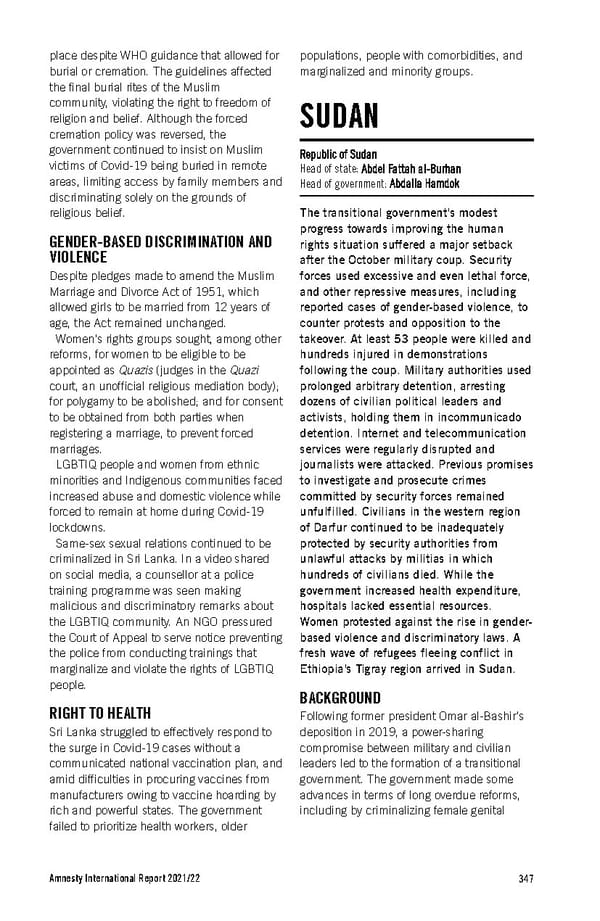place despite WHO guidance that allowed for populations, people with comorbidities, and burial or cremation. The guidelines affected marginalized and minority groups. the final burial rites of the Muslim community, violating the right to freedom of religion and belief. Although the forced SUDAN cremation policy was reversed, the government continued to insist on Muslim Republic of Sudan victims of Covid-19 being buried in remote Head of state: Abdel Fattah al-Burhan areas, limiting access by family members and Head of government: Abdalla Hamdok discriminating solely on the grounds of religious belief. The transitional government’s modest GENDER-BASED DISCRIMINATION AND progress towards improving the human VIOLENCE rights situation suffered a major setback after the October military coup. Security Despite pledges made to amend the Muslim forces used excessive and even lethal force, Marriage and Divorce Act of 1951, which and other repressive measures, including allowed girls to be married from 12 years of reported cases of gender-based violence, to age, the Act remained unchanged. counter protests and opposition to the Women’s rights groups sought, among other takeover. At least 53 people were killed and reforms, for women to be eligible to be hundreds injured in demonstrations appointed as Quazis (judges in the Quazi following the coup. Military authorities used court, an unofficial religious mediation body); prolonged arbitrary detention, arresting for polygamy to be abolished; and for consent dozens of civilian political leaders and to be obtained from both parties when activists, holding them in incommunicado registering a marriage, to prevent forced detention. Internet and telecommunication marriages. services were regularly disrupted and LGBTIQ people and women from ethnic journalists were attacked. Previous promises minorities and Indigenous communities faced to investigate and prosecute crimes increased abuse and domestic violence while committed by security forces remained forced to remain at home during Covid-19 unfulfilled. Civilians in the western region lockdowns. of Darfur continued to be inadequately Same-sex sexual relations continued to be protected by security authorities from criminalized in Sri Lanka. In a video shared unlawful attacks by militias in which on social media, a counsellor at a police hundreds of civilians died. While the training programme was seen making government increased health expenditure, malicious and discriminatory remarks about hospitals lacked essential resources. the LGBTIQ community. An NGO pressured Women protested against the rise in gender- the Court of Appeal to serve notice preventing based violence and discriminatory laws. A the police from conducting trainings that fresh wave of refugees fleeing conflict in marginalize and violate the rights of LGBTIQ Ethiopia’s Tigray region arrived in Sudan. people. BACKGROUND RIGHT TO HEALTH Following former president Omar al-Bashir’s Sri Lanka struggled to effectively respond to deposition in 2019, a power-sharing the surge in Covid-19 cases without a compromise between military and civilian communicated national vaccination plan, and leaders led to the formation of a transitional amid difficulties in procuring vaccines from government. The government made some manufacturers owing to vaccine hoarding by advances in terms of long overdue reforms, rich and powerful states. The government including by criminalizing female genital failed to prioritize health workers, older Amnesty International Report 2021/22 347
 Amnesty International Report 2021/22 Page 346 Page 348
Amnesty International Report 2021/22 Page 346 Page 348